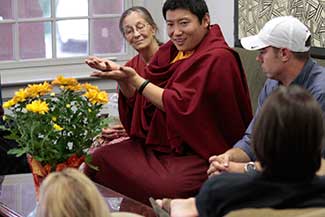Change Your Mind, Change Your World
by Julie Lineback
“When we talk about meditation in the Buddhist tradition, we are not talking about being in some nice place. We are talking hardcore. What is your anger?”

Tibetan Buddhist lama Kyabgön Phakchok Rinpoche also attended a brown bag lunch discussion while visiting UWG. His visit was hosted by the College of Social Science's department of psychology.
Those were some of the first words Tibetan Buddhist lama Kyabgön Phakchok Rinpoche shared when he recently spoke to a crowded room at the University of West Georgia Campus Center. The lecture, “Meditation and the Path of Transformation,” was presented for psychology professor Dr. Alan Pope’s Eastern and Transpersonal Psychologies class and was also open to the public. The class was the first stop on his visit to UWG.
Phakchok Rinpoche shared personal anecdotes and advised the audience that timing is key to learning meditation. It’s very important, he said, to learn when one is in good health emotionally and physically. The healthy way of living is now learning from how your mind functions, how to be calm, and how to recognize your own weaknesses and strengths.
“Many people who learn meditation will find someplace quiet with flowers, music and a comfortable cushion, and visualize oceans and birds and walking on beach,” he continued. “That practice doesn’t help you solve your own problem. It doesn’t help you deal with your own mind.”
The first step in meditation, Phakchok Rinpoche encouraged, is to find one negative trait. He confided that as a young man, he dealt with anger issues and was easily irritated. He said that he likes to think a lot and think fast. The problem of a fast mind is that it leads to easier irritation, he stated.
“When your mind becomes tired, negative emotions come easier,” Phakchok Rinpoche explained. “When you can see the whole picture easier, understand easier and are less tired in your mind, stress levels go down. The majority of stress comes from spending your energy on negative things. See the worry then spend the energy solving it.”
Phakchok Rinpoche led the audience in a brief meditation exercise. He sat in the lotus position, in which the feet are placed on opposing sides, while the listeners sat in their chairs. He instructed the group on the proper way of breathing and how to focus on their breath.
He said that people often worry that by choosing a fault, it makes them feel bad about themselves. Judgment, whether it’s other people or yourself, is unhealthy. Learning meditation begins when you see how to transform.
“Whenever the anger arises in your mind, be like the lion; don’t chase, but look at the anger,” he concluded. “If you look at the anger, it disappears.”
Do you have a comment or opinion about this story's topic? Perspective Online wants to hear from you. Submit a letter to the editor today.
